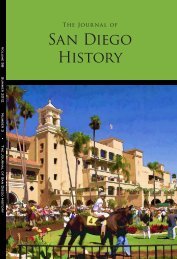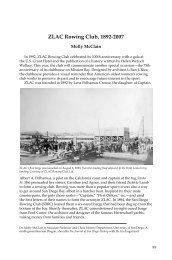The Journal of San Diego History - San Diego History Center
The Journal of San Diego History - San Diego History Center
The Journal of San Diego History - San Diego History Center
Create successful ePaper yourself
Turn your PDF publications into a flip-book with our unique Google optimized e-Paper software.
<strong>The</strong> <strong>Journal</strong> <strong>of</strong> <strong>San</strong> <strong>Diego</strong> <strong>History</strong><br />
to me after the meeting for further explanation. I also said that on two <strong>of</strong> the Reservations<br />
there would be more land than the Indians living on them would need,<br />
and they must give up the idea <strong>of</strong> living where they had always lived, and take<br />
land where they could get it. 64<br />
Mr. Coronel talked to them in the same line, and with good effect.<br />
I also said that while we were trying to fight their battles for them, they were<br />
protecting and supporting the most destructive enemies they had. That the government<br />
had sent out a man to discover and punish the men who were debauching<br />
their women and robbing them <strong>of</strong> everything they had, by means <strong>of</strong> whiskey and<br />
gambling; and instead <strong>of</strong> helping him fight their enemies, they were concealing<br />
and protecting them. That I could<br />
not do much for them with my<br />
friends in the east, if they should<br />
be told that these Indians were<br />
a miserable, whiskey-drinking,<br />
debauched people. We could not<br />
lead men to victory who fell out by<br />
the way side drunk; or who took<br />
to the bushes to gamble. That Col.<br />
Wallace was here to-day to help<br />
them drive out their enemies, and I<br />
wanted them to help him do it. <strong>The</strong><br />
Col. then explained what he had<br />
come to do, and what steps must be<br />
taken by then, and would see any<br />
who would undertake to furnish<br />
pro<strong>of</strong> against liquor sellers. A number<br />
came to the Col., and said they<br />
would do all they could now that<br />
they knew how to stop the traffic.<br />
<strong>The</strong> day was a very laborious<br />
one, and I believe valuable in every<br />
way.<br />
It is said that Bishop Mora has<br />
sold his ranch to a Boston syndicate.<br />
65<br />
Tatahuila dancer at Rincon, 1912. ©SDHS #86-15752-111.<br />
Photo by E.H. Davis.<br />
He either owned, or did not own the lands on which the Indians lived: if he did<br />
not, <strong>of</strong> course he could not sell it; if he did, then he could scarce pass as a friend <strong>of</strong><br />
these poor people if he did not except from the sale <strong>of</strong> their homes.<br />
Mrs. Coronel was told by an Indian woman that the Indians whipped him out<br />
<strong>of</strong> their church at Pala not long since.<br />
At Rincon, La Peche and La Jolla the situation is unchanged. 66 <strong>The</strong> school at<br />
La Peche, taught by a lady from Georgia, does not amount to much. <strong>The</strong> House is<br />
full, but the teacher poor. <strong>The</strong> house a disgrace to any grade <strong>of</strong> civilization. A new<br />
house, built under Ward. It would be as easy almost to warm the country about it<br />
as the inside <strong>of</strong> it. <strong>The</strong> water question gives great anxiety.<br />
Mrs. Col. Couts has as yet, taken no steps, I believe to make good her claim to<br />
8,848 acres <strong>of</strong> La Jolla, based upon a grant made in 1845 to Jose and Pablo Apis, and<br />
104




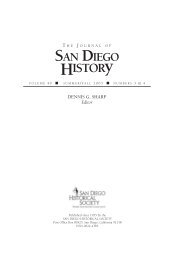
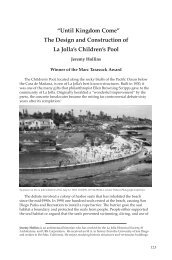
![[PDF] The Journal of San Diego History Vol 52: Nos 1 & 2](https://img.yumpu.com/25984149/1/172x260/pdf-the-journal-of-san-diego-history-vol-52-nos-1-2.jpg?quality=85)
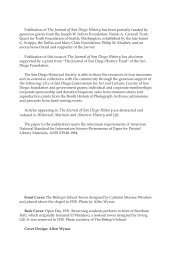
![[PDF] The Journal of San Diego History - San Diego History Center](https://img.yumpu.com/25984131/1/172x260/pdf-the-journal-of-san-diego-history-san-diego-history-center.jpg?quality=85)



